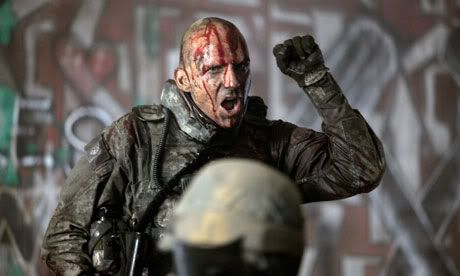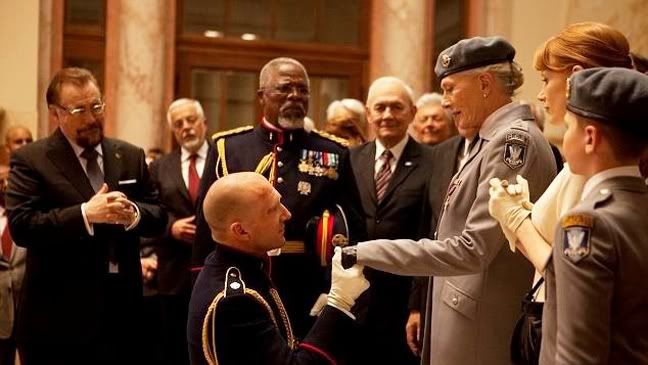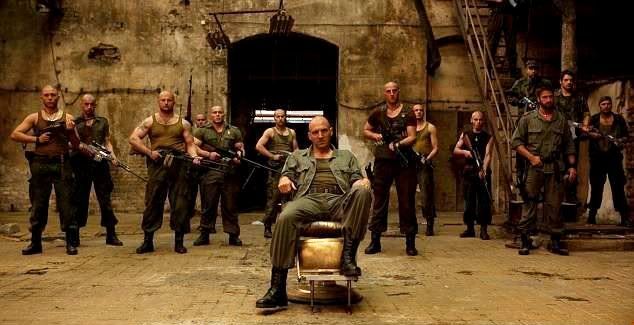Coriolanus

Title: Coriolanus
Rating: 4/5
Genre: Drama, Thriller
Starring: Ralph Fiennes, Gerard Butler, Vanessa Redgrave, Brian Cox
Director: Ralph Fiennes
 Renowned stage actor Fiennes making a splash with his directorial debut, a tale I regret not managing to see when it first hit the big screen earlier this year for it's limited and short-lived run. It's perhaps not all that surprising given the subject matter, even the title “Coriolanus” giving way to fears from some that some of the language might not be as simple as other contemporary films, and the second you hear it's less action and more talk; political displays of power and manipulation of the masses into doing their bidding, well I expect that's already caused most to tune out. With the current trend of instant gratification from films; of never finding yourself pondering the choice of words or their meaning, or a story where the real strength lies in the use of language and the action is merely there to give it all context, it would seem there is little room for even the most unfamiliar and poorly explored of Shakespeare's work.
Renowned stage actor Fiennes making a splash with his directorial debut, a tale I regret not managing to see when it first hit the big screen earlier this year for it's limited and short-lived run. It's perhaps not all that surprising given the subject matter, even the title “Coriolanus” giving way to fears from some that some of the language might not be as simple as other contemporary films, and the second you hear it's less action and more talk; political displays of power and manipulation of the masses into doing their bidding, well I expect that's already caused most to tune out. With the current trend of instant gratification from films; of never finding yourself pondering the choice of words or their meaning, or a story where the real strength lies in the use of language and the action is merely there to give it all context, it would seem there is little room for even the most unfamiliar and poorly explored of Shakespeare's work.Indeed, this is the first film adaptation of Coriolanus to have been made and you could have hardly asked for a better man at the helm than one known for his Shakespearean theatrical work (even if his more recent film work might be better known these days). Caius Martius (Fiennes) is a soldier in a war-torn Rome, the citizens riot out of hunger and it is all he can do to not to kill them where they stand, holding them in contempt for complaining but remaining unwilling to fight for their country. As contemptible as his actions might be, it is when he enters battle that he does so with a ferocity to behold, bleeding and alone he never hesitates in his quest to push back the Volscian army led by Aufidius (Butler); a one man army whose seen battle countless times and never has he failed in his mission. Upon his return to Rome he is hailed a war hero and granted the title of Coriolanus (General), and with his newly found fame is convinced by his mother to enter politics and join the consul.
 It is with reluctance that he agrees and it isn't long before he gains the support of the Senate, and at first, it would seem even the commoners were willing to fall in line, but the treacherous Brutus and Sicinius (Nesbitt) fear what his coming to power could mean, and so manipulate the people into turning against him. Pointing out his outward disdain for the common man, the ensuing media frenzy provoke him into speaking out against them, incapable of holding his tongue and denouncing the very concept of ruling through popularity amongst the people, believing fervently in a superiority in those who would fight for their country over those who would refuse. Brandished a traitor he is banished from the city, leaving for the Volsci army to offer his services and fight against his own country and get revenge on those who would betray him.
It is with reluctance that he agrees and it isn't long before he gains the support of the Senate, and at first, it would seem even the commoners were willing to fall in line, but the treacherous Brutus and Sicinius (Nesbitt) fear what his coming to power could mean, and so manipulate the people into turning against him. Pointing out his outward disdain for the common man, the ensuing media frenzy provoke him into speaking out against them, incapable of holding his tongue and denouncing the very concept of ruling through popularity amongst the people, believing fervently in a superiority in those who would fight for their country over those who would refuse. Brandished a traitor he is banished from the city, leaving for the Volsci army to offer his services and fight against his own country and get revenge on those who would betray him. There are no heroes to behold here, our protagonist remains an arrogant and thoroughly dislikeable character; a name made from the blood of his enemies, unwilling to bow down to the people and listen to their plight and would rather use his power to silence them through force, like a dictator trying to survive in a democracy. Whilst politicians are little different than Coriolanus himself, it is often only through deception that they retain their seat in power – the true power of charisma – yet by virtues of his accomplishments and ability in battle he is constantly found himself atop a throne, worshipped by the masses as a superior being – a point he believes himself – and feared by all those with power should he undermine their authority, for those with power scarcely are happy to see it diminished.
The language is both a blessing and a curse, poetic on the surface but always with a deep meaning to be extracted, and whilst the meaning behind each metaphor may not always go understood, the general tone of the proceedings never fails to make itself apparent. For those familiar with Shakespeare's work you'll find that despite the modern setting very little has changed. There are still grandiose speeches and monologues between the characters, each given their own background and desires; women aren't seen so much as the weaker gender but the manipulative mother of Coriolanus
 ultimately presents herself as the one wielding the real power in this war. The physicality of their actions and melodramatic way in which they proceed lends a genuine old-fashioned tone to the proceedings; an odd juxtaposition of old and new that would feel out of place if it didn't still feel so damn relevant. The material feels almost untouched from the original script yet breathed new life through the modern setting; a tale telling of the dangers of the inherent corrupting nature of power and the fear of losing that power; of politicians proudly putting on serpentine smiles, pandering to the people whilst plotting behind their backs. Those awaiting the next Branagh to emerge may have found him in Fiennes, but those who still despise Shakespeare from their school days will find little here to persuade them otherwise.
ultimately presents herself as the one wielding the real power in this war. The physicality of their actions and melodramatic way in which they proceed lends a genuine old-fashioned tone to the proceedings; an odd juxtaposition of old and new that would feel out of place if it didn't still feel so damn relevant. The material feels almost untouched from the original script yet breathed new life through the modern setting; a tale telling of the dangers of the inherent corrupting nature of power and the fear of losing that power; of politicians proudly putting on serpentine smiles, pandering to the people whilst plotting behind their backs. Those awaiting the next Branagh to emerge may have found him in Fiennes, but those who still despise Shakespeare from their school days will find little here to persuade them otherwise.

Comments
Post a Comment